Evaluating Strategic Leadership: Unilever UK Ltd, Unit 7013V1 Report
VerifiedAdded on 2019/12/28
|20
|6374
|400
Report
AI Summary
This report analyzes strategic leadership within Unilever UK Ltd., examining the relationship between strategic management and leadership, emphasizing their distinct yet interconnected roles in achieving organizational goals. It evaluates the impact of Unilever's culture and values on strategic leadership, highlighting how a positive, collaborative culture influences employee behavior and decision-making. The report also discusses the impact of company-specific, legal, regulatory, and ethical requirements on strategic leadership, emphasizing compliance with employment laws, anti-discrimination policies, and health and safety measures. Finally, it assesses current and emerging social concerns, such as diversity, and expectations impacting strategic leadership, underscoring the need for ethical practices and the management of a diverse workforce to meet evolving societal demands. The analysis includes application of various leadership approaches like situational, bureaucratic and transactional leadership for effective management.
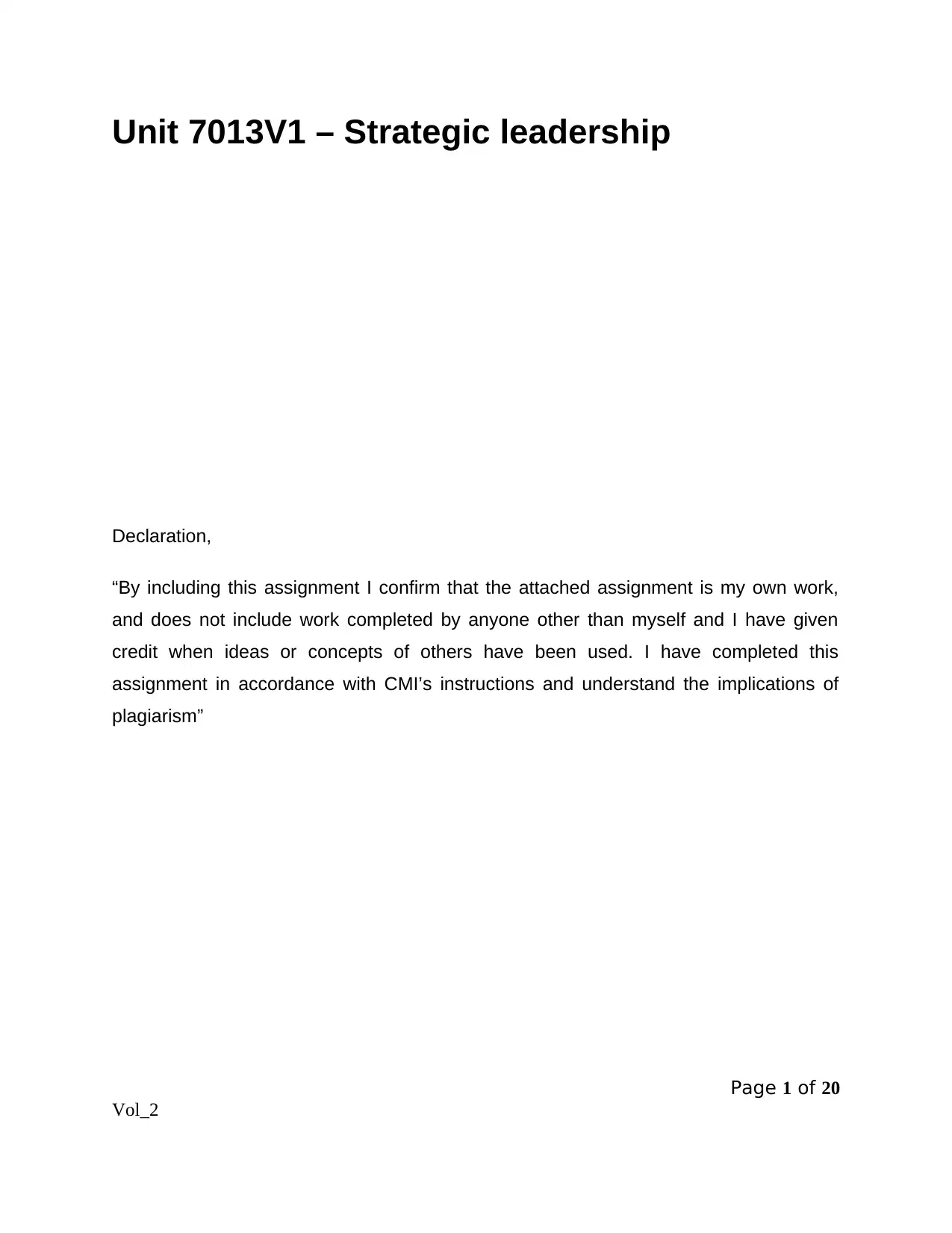
Unit 7013V1 – Strategic leadership
Declaration,
“By including this assignment I confirm that the attached assignment is my own work,
and does not include work completed by anyone other than myself and I have given
credit when ideas or concepts of others have been used. I have completed this
assignment in accordance with CMI’s instructions and understand the implications of
plagiarism”
Page 1 of 20
Vol_2
Declaration,
“By including this assignment I confirm that the attached assignment is my own work,
and does not include work completed by anyone other than myself and I have given
credit when ideas or concepts of others have been used. I have completed this
assignment in accordance with CMI’s instructions and understand the implications of
plagiarism”
Page 1 of 20
Vol_2
Paraphrase This Document
Need a fresh take? Get an instant paraphrase of this document with our AI Paraphraser
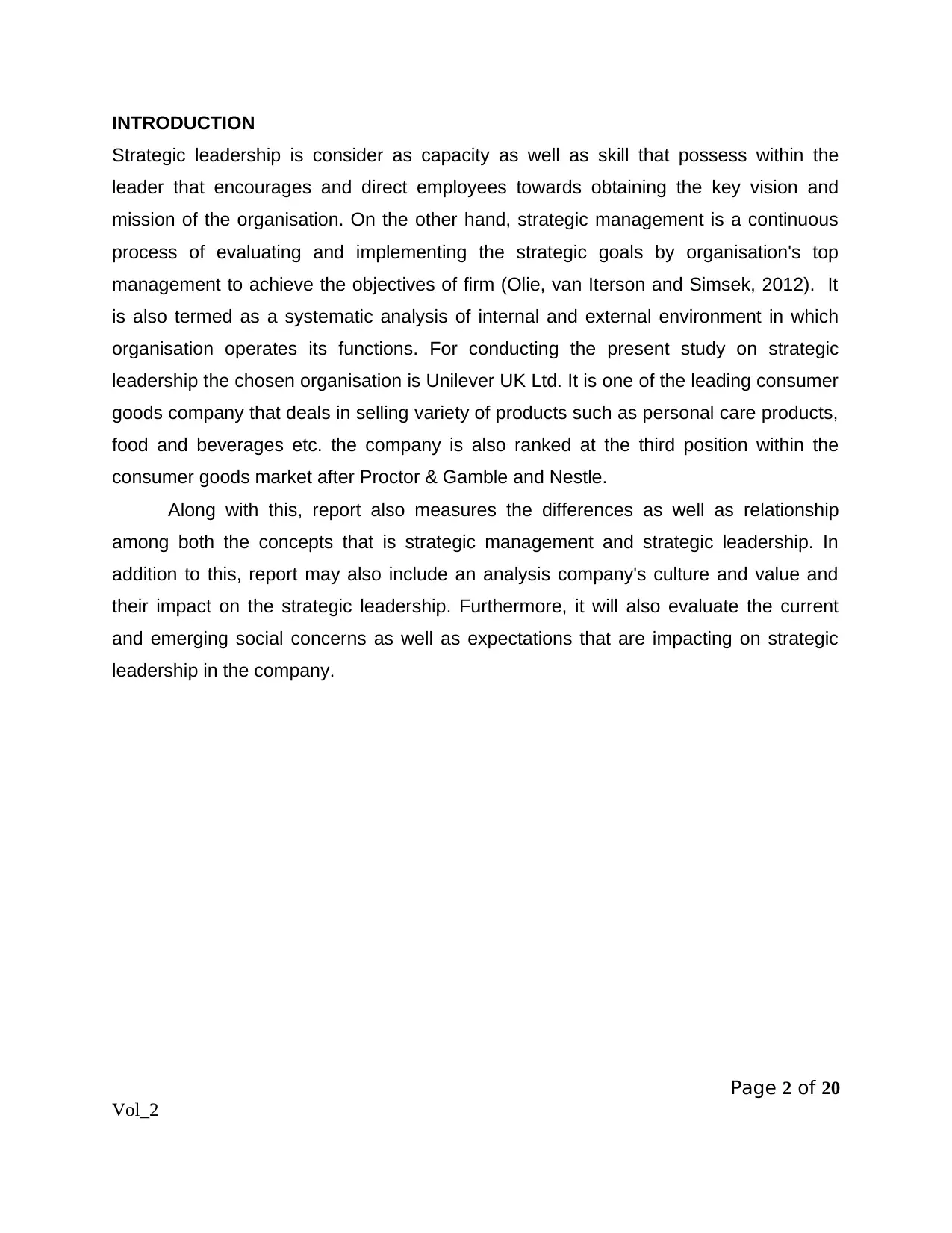
INTRODUCTION
Strategic leadership is consider as capacity as well as skill that possess within the
leader that encourages and direct employees towards obtaining the key vision and
mission of the organisation. On the other hand, strategic management is a continuous
process of evaluating and implementing the strategic goals by organisation's top
management to achieve the objectives of firm (Olie, van Iterson and Simsek, 2012). It
is also termed as a systematic analysis of internal and external environment in which
organisation operates its functions. For conducting the present study on strategic
leadership the chosen organisation is Unilever UK Ltd. It is one of the leading consumer
goods company that deals in selling variety of products such as personal care products,
food and beverages etc. the company is also ranked at the third position within the
consumer goods market after Proctor & Gamble and Nestle.
Along with this, report also measures the differences as well as relationship
among both the concepts that is strategic management and strategic leadership. In
addition to this, report may also include an analysis company's culture and value and
their impact on the strategic leadership. Furthermore, it will also evaluate the current
and emerging social concerns as well as expectations that are impacting on strategic
leadership in the company.
Page 2 of 20
Vol_2
Strategic leadership is consider as capacity as well as skill that possess within the
leader that encourages and direct employees towards obtaining the key vision and
mission of the organisation. On the other hand, strategic management is a continuous
process of evaluating and implementing the strategic goals by organisation's top
management to achieve the objectives of firm (Olie, van Iterson and Simsek, 2012). It
is also termed as a systematic analysis of internal and external environment in which
organisation operates its functions. For conducting the present study on strategic
leadership the chosen organisation is Unilever UK Ltd. It is one of the leading consumer
goods company that deals in selling variety of products such as personal care products,
food and beverages etc. the company is also ranked at the third position within the
consumer goods market after Proctor & Gamble and Nestle.
Along with this, report also measures the differences as well as relationship
among both the concepts that is strategic management and strategic leadership. In
addition to this, report may also include an analysis company's culture and value and
their impact on the strategic leadership. Furthermore, it will also evaluate the current
and emerging social concerns as well as expectations that are impacting on strategic
leadership in the company.
Page 2 of 20
Vol_2
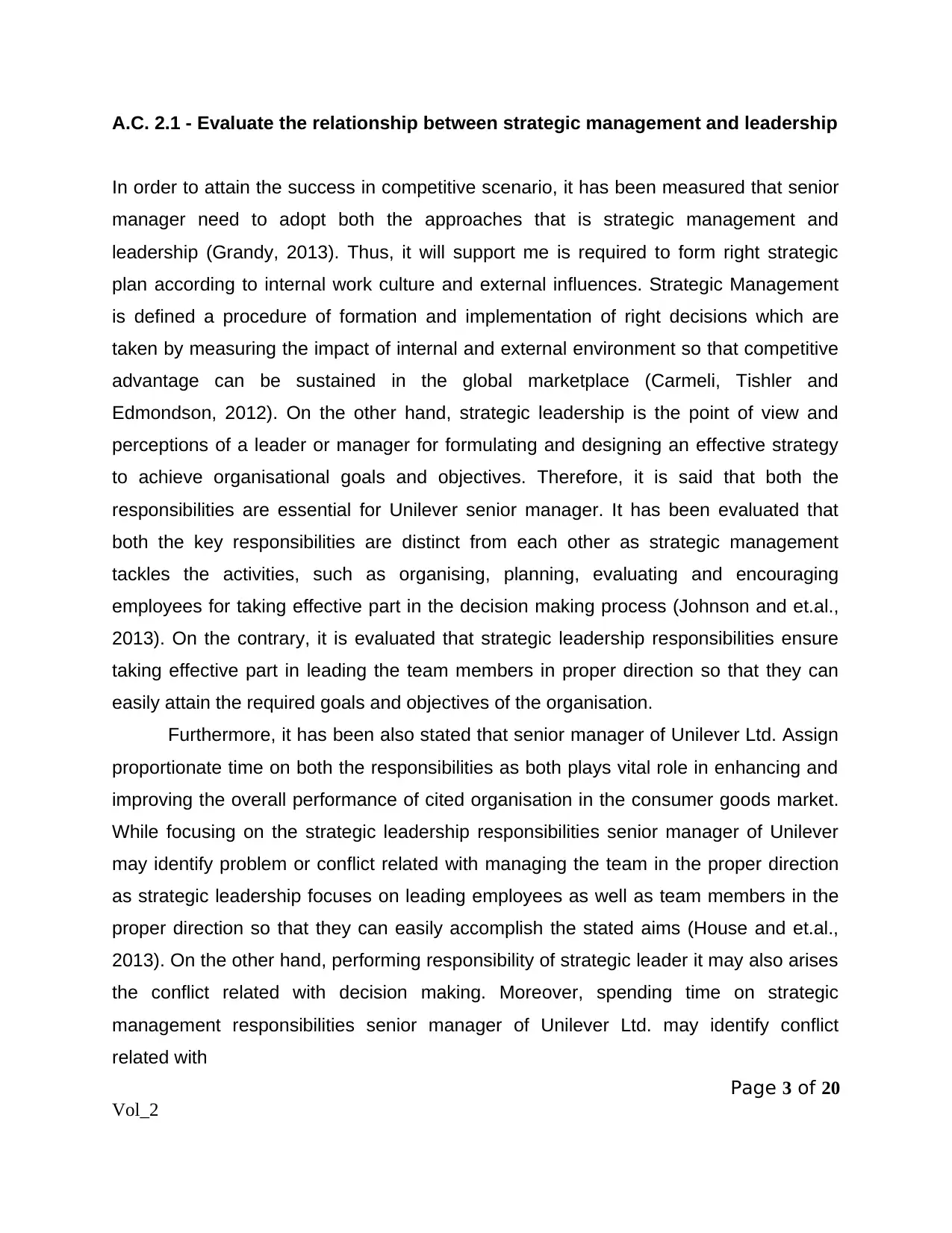
A.C. 2.1 - Evaluate the relationship between strategic management and leadership
In order to attain the success in competitive scenario, it has been measured that senior
manager need to adopt both the approaches that is strategic management and
leadership (Grandy, 2013). Thus, it will support me is required to form right strategic
plan according to internal work culture and external influences. Strategic Management
is defined a procedure of formation and implementation of right decisions which are
taken by measuring the impact of internal and external environment so that competitive
advantage can be sustained in the global marketplace (Carmeli, Tishler and
Edmondson, 2012). On the other hand, strategic leadership is the point of view and
perceptions of a leader or manager for formulating and designing an effective strategy
to achieve organisational goals and objectives. Therefore, it is said that both the
responsibilities are essential for Unilever senior manager. It has been evaluated that
both the key responsibilities are distinct from each other as strategic management
tackles the activities, such as organising, planning, evaluating and encouraging
employees for taking effective part in the decision making process (Johnson and et.al.,
2013). On the contrary, it is evaluated that strategic leadership responsibilities ensure
taking effective part in leading the team members in proper direction so that they can
easily attain the required goals and objectives of the organisation.
Furthermore, it has been also stated that senior manager of Unilever Ltd. Assign
proportionate time on both the responsibilities as both plays vital role in enhancing and
improving the overall performance of cited organisation in the consumer goods market.
While focusing on the strategic leadership responsibilities senior manager of Unilever
may identify problem or conflict related with managing the team in the proper direction
as strategic leadership focuses on leading employees as well as team members in the
proper direction so that they can easily accomplish the stated aims (House and et.al.,
2013). On the other hand, performing responsibility of strategic leader it may also arises
the conflict related with decision making. Moreover, spending time on strategic
management responsibilities senior manager of Unilever Ltd. may identify conflict
related with
Page 3 of 20
Vol_2
In order to attain the success in competitive scenario, it has been measured that senior
manager need to adopt both the approaches that is strategic management and
leadership (Grandy, 2013). Thus, it will support me is required to form right strategic
plan according to internal work culture and external influences. Strategic Management
is defined a procedure of formation and implementation of right decisions which are
taken by measuring the impact of internal and external environment so that competitive
advantage can be sustained in the global marketplace (Carmeli, Tishler and
Edmondson, 2012). On the other hand, strategic leadership is the point of view and
perceptions of a leader or manager for formulating and designing an effective strategy
to achieve organisational goals and objectives. Therefore, it is said that both the
responsibilities are essential for Unilever senior manager. It has been evaluated that
both the key responsibilities are distinct from each other as strategic management
tackles the activities, such as organising, planning, evaluating and encouraging
employees for taking effective part in the decision making process (Johnson and et.al.,
2013). On the contrary, it is evaluated that strategic leadership responsibilities ensure
taking effective part in leading the team members in proper direction so that they can
easily attain the required goals and objectives of the organisation.
Furthermore, it has been also stated that senior manager of Unilever Ltd. Assign
proportionate time on both the responsibilities as both plays vital role in enhancing and
improving the overall performance of cited organisation in the consumer goods market.
While focusing on the strategic leadership responsibilities senior manager of Unilever
may identify problem or conflict related with managing the team in the proper direction
as strategic leadership focuses on leading employees as well as team members in the
proper direction so that they can easily accomplish the stated aims (House and et.al.,
2013). On the other hand, performing responsibility of strategic leader it may also arises
the conflict related with decision making. Moreover, spending time on strategic
management responsibilities senior manager of Unilever Ltd. may identify conflict
related with
Page 3 of 20
Vol_2
⊘ This is a preview!⊘
Do you want full access?
Subscribe today to unlock all pages.

Trusted by 1+ million students worldwide
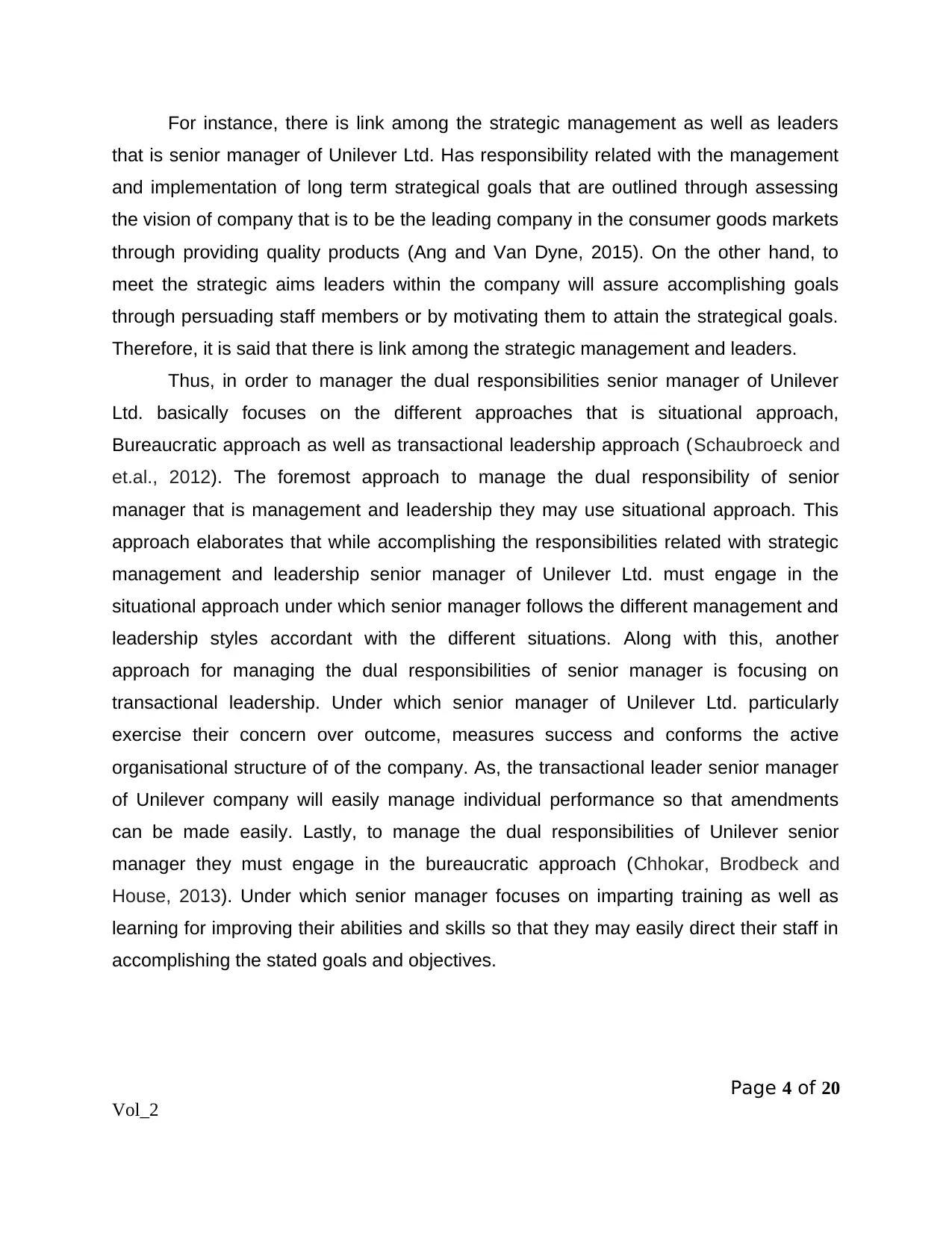
For instance, there is link among the strategic management as well as leaders
that is senior manager of Unilever Ltd. Has responsibility related with the management
and implementation of long term strategical goals that are outlined through assessing
the vision of company that is to be the leading company in the consumer goods markets
through providing quality products (Ang and Van Dyne, 2015). On the other hand, to
meet the strategic aims leaders within the company will assure accomplishing goals
through persuading staff members or by motivating them to attain the strategical goals.
Therefore, it is said that there is link among the strategic management and leaders.
Thus, in order to manager the dual responsibilities senior manager of Unilever
Ltd. basically focuses on the different approaches that is situational approach,
Bureaucratic approach as well as transactional leadership approach (Schaubroeck and
et.al., 2012). The foremost approach to manage the dual responsibility of senior
manager that is management and leadership they may use situational approach. This
approach elaborates that while accomplishing the responsibilities related with strategic
management and leadership senior manager of Unilever Ltd. must engage in the
situational approach under which senior manager follows the different management and
leadership styles accordant with the different situations. Along with this, another
approach for managing the dual responsibilities of senior manager is focusing on
transactional leadership. Under which senior manager of Unilever Ltd. particularly
exercise their concern over outcome, measures success and conforms the active
organisational structure of of the company. As, the transactional leader senior manager
of Unilever company will easily manage individual performance so that amendments
can be made easily. Lastly, to manage the dual responsibilities of Unilever senior
manager they must engage in the bureaucratic approach (Chhokar, Brodbeck and
House, 2013). Under which senior manager focuses on imparting training as well as
learning for improving their abilities and skills so that they may easily direct their staff in
accomplishing the stated goals and objectives.
Page 4 of 20
Vol_2
that is senior manager of Unilever Ltd. Has responsibility related with the management
and implementation of long term strategical goals that are outlined through assessing
the vision of company that is to be the leading company in the consumer goods markets
through providing quality products (Ang and Van Dyne, 2015). On the other hand, to
meet the strategic aims leaders within the company will assure accomplishing goals
through persuading staff members or by motivating them to attain the strategical goals.
Therefore, it is said that there is link among the strategic management and leaders.
Thus, in order to manager the dual responsibilities senior manager of Unilever
Ltd. basically focuses on the different approaches that is situational approach,
Bureaucratic approach as well as transactional leadership approach (Schaubroeck and
et.al., 2012). The foremost approach to manage the dual responsibility of senior
manager that is management and leadership they may use situational approach. This
approach elaborates that while accomplishing the responsibilities related with strategic
management and leadership senior manager of Unilever Ltd. must engage in the
situational approach under which senior manager follows the different management and
leadership styles accordant with the different situations. Along with this, another
approach for managing the dual responsibilities of senior manager is focusing on
transactional leadership. Under which senior manager of Unilever Ltd. particularly
exercise their concern over outcome, measures success and conforms the active
organisational structure of of the company. As, the transactional leader senior manager
of Unilever company will easily manage individual performance so that amendments
can be made easily. Lastly, to manage the dual responsibilities of Unilever senior
manager they must engage in the bureaucratic approach (Chhokar, Brodbeck and
House, 2013). Under which senior manager focuses on imparting training as well as
learning for improving their abilities and skills so that they may easily direct their staff in
accomplishing the stated goals and objectives.
Page 4 of 20
Vol_2
Paraphrase This Document
Need a fresh take? Get an instant paraphrase of this document with our AI Paraphraser
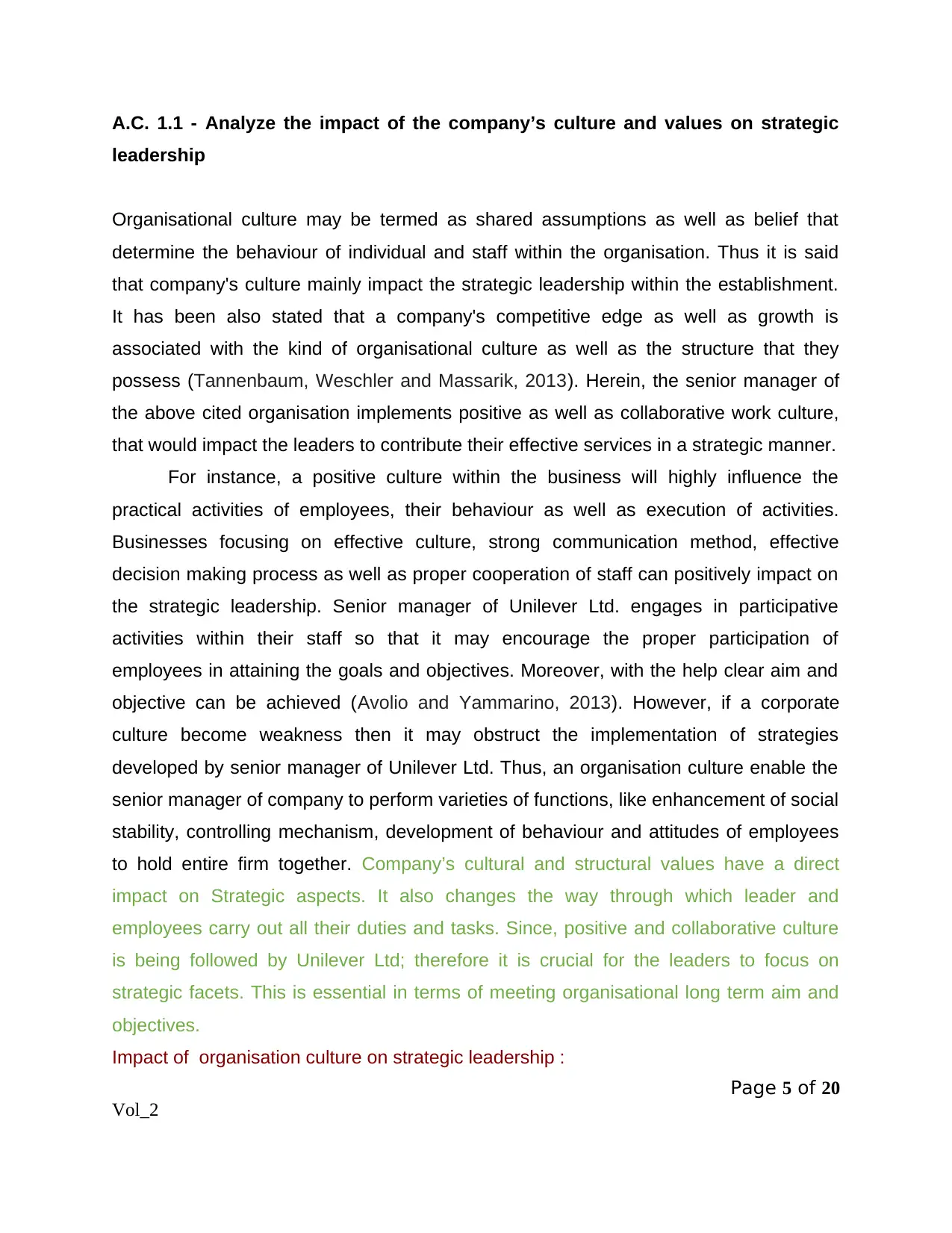
A.C. 1.1 - Analyze the impact of the company’s culture and values on strategic
leadership
Organisational culture may be termed as shared assumptions as well as belief that
determine the behaviour of individual and staff within the organisation. Thus it is said
that company's culture mainly impact the strategic leadership within the establishment.
It has been also stated that a company's competitive edge as well as growth is
associated with the kind of organisational culture as well as the structure that they
possess (Tannenbaum, Weschler and Massarik, 2013). Herein, the senior manager of
the above cited organisation implements positive as well as collaborative work culture,
that would impact the leaders to contribute their effective services in a strategic manner.
For instance, a positive culture within the business will highly influence the
practical activities of employees, their behaviour as well as execution of activities.
Businesses focusing on effective culture, strong communication method, effective
decision making process as well as proper cooperation of staff can positively impact on
the strategic leadership. Senior manager of Unilever Ltd. engages in participative
activities within their staff so that it may encourage the proper participation of
employees in attaining the goals and objectives. Moreover, with the help clear aim and
objective can be achieved (Avolio and Yammarino, 2013). However, if a corporate
culture become weakness then it may obstruct the implementation of strategies
developed by senior manager of Unilever Ltd. Thus, an organisation culture enable the
senior manager of company to perform varieties of functions, like enhancement of social
stability, controlling mechanism, development of behaviour and attitudes of employees
to hold entire firm together. Company’s cultural and structural values have a direct
impact on Strategic aspects. It also changes the way through which leader and
employees carry out all their duties and tasks. Since, positive and collaborative culture
is being followed by Unilever Ltd; therefore it is crucial for the leaders to focus on
strategic facets. This is essential in terms of meeting organisational long term aim and
objectives.
Impact of organisation culture on strategic leadership :
Page 5 of 20
Vol_2
leadership
Organisational culture may be termed as shared assumptions as well as belief that
determine the behaviour of individual and staff within the organisation. Thus it is said
that company's culture mainly impact the strategic leadership within the establishment.
It has been also stated that a company's competitive edge as well as growth is
associated with the kind of organisational culture as well as the structure that they
possess (Tannenbaum, Weschler and Massarik, 2013). Herein, the senior manager of
the above cited organisation implements positive as well as collaborative work culture,
that would impact the leaders to contribute their effective services in a strategic manner.
For instance, a positive culture within the business will highly influence the
practical activities of employees, their behaviour as well as execution of activities.
Businesses focusing on effective culture, strong communication method, effective
decision making process as well as proper cooperation of staff can positively impact on
the strategic leadership. Senior manager of Unilever Ltd. engages in participative
activities within their staff so that it may encourage the proper participation of
employees in attaining the goals and objectives. Moreover, with the help clear aim and
objective can be achieved (Avolio and Yammarino, 2013). However, if a corporate
culture become weakness then it may obstruct the implementation of strategies
developed by senior manager of Unilever Ltd. Thus, an organisation culture enable the
senior manager of company to perform varieties of functions, like enhancement of social
stability, controlling mechanism, development of behaviour and attitudes of employees
to hold entire firm together. Company’s cultural and structural values have a direct
impact on Strategic aspects. It also changes the way through which leader and
employees carry out all their duties and tasks. Since, positive and collaborative culture
is being followed by Unilever Ltd; therefore it is crucial for the leaders to focus on
strategic facets. This is essential in terms of meeting organisational long term aim and
objectives.
Impact of organisation culture on strategic leadership :
Page 5 of 20
Vol_2
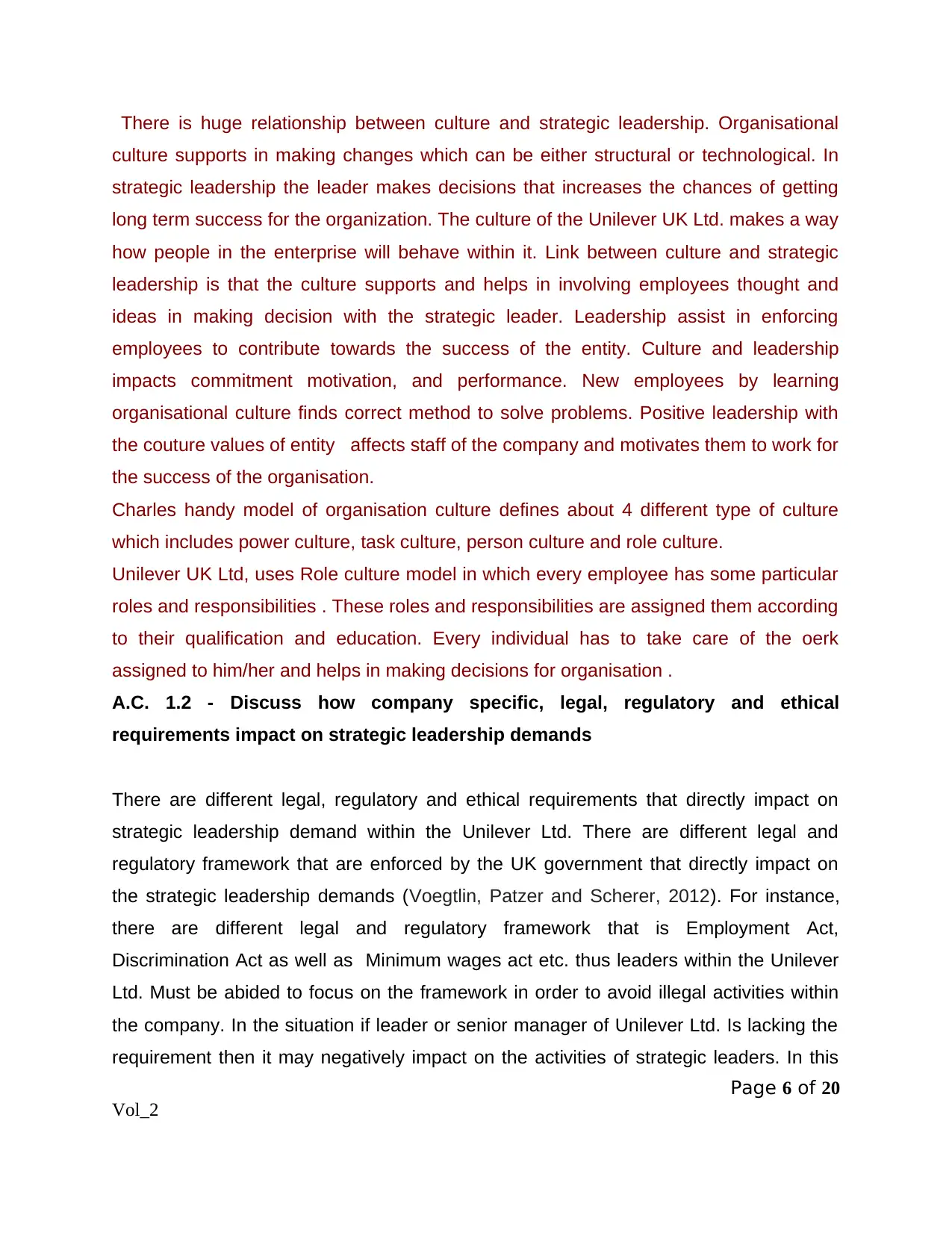
There is huge relationship between culture and strategic leadership. Organisational
culture supports in making changes which can be either structural or technological. In
strategic leadership the leader makes decisions that increases the chances of getting
long term success for the organization. The culture of the Unilever UK Ltd. makes a way
how people in the enterprise will behave within it. Link between culture and strategic
leadership is that the culture supports and helps in involving employees thought and
ideas in making decision with the strategic leader. Leadership assist in enforcing
employees to contribute towards the success of the entity. Culture and leadership
impacts commitment motivation, and performance. New employees by learning
organisational culture finds correct method to solve problems. Positive leadership with
the couture values of entity affects staff of the company and motivates them to work for
the success of the organisation.
Charles handy model of organisation culture defines about 4 different type of culture
which includes power culture, task culture, person culture and role culture.
Unilever UK Ltd, uses Role culture model in which every employee has some particular
roles and responsibilities . These roles and responsibilities are assigned them according
to their qualification and education. Every individual has to take care of the oerk
assigned to him/her and helps in making decisions for organisation .
A.C. 1.2 - Discuss how company specific, legal, regulatory and ethical
requirements impact on strategic leadership demands
There are different legal, regulatory and ethical requirements that directly impact on
strategic leadership demand within the Unilever Ltd. There are different legal and
regulatory framework that are enforced by the UK government that directly impact on
the strategic leadership demands (Voegtlin, Patzer and Scherer, 2012). For instance,
there are different legal and regulatory framework that is Employment Act,
Discrimination Act as well as Minimum wages act etc. thus leaders within the Unilever
Ltd. Must be abided to focus on the framework in order to avoid illegal activities within
the company. In the situation if leader or senior manager of Unilever Ltd. Is lacking the
requirement then it may negatively impact on the activities of strategic leaders. In this
Page 6 of 20
Vol_2
culture supports in making changes which can be either structural or technological. In
strategic leadership the leader makes decisions that increases the chances of getting
long term success for the organization. The culture of the Unilever UK Ltd. makes a way
how people in the enterprise will behave within it. Link between culture and strategic
leadership is that the culture supports and helps in involving employees thought and
ideas in making decision with the strategic leader. Leadership assist in enforcing
employees to contribute towards the success of the entity. Culture and leadership
impacts commitment motivation, and performance. New employees by learning
organisational culture finds correct method to solve problems. Positive leadership with
the couture values of entity affects staff of the company and motivates them to work for
the success of the organisation.
Charles handy model of organisation culture defines about 4 different type of culture
which includes power culture, task culture, person culture and role culture.
Unilever UK Ltd, uses Role culture model in which every employee has some particular
roles and responsibilities . These roles and responsibilities are assigned them according
to their qualification and education. Every individual has to take care of the oerk
assigned to him/her and helps in making decisions for organisation .
A.C. 1.2 - Discuss how company specific, legal, regulatory and ethical
requirements impact on strategic leadership demands
There are different legal, regulatory and ethical requirements that directly impact on
strategic leadership demand within the Unilever Ltd. There are different legal and
regulatory framework that are enforced by the UK government that directly impact on
the strategic leadership demands (Voegtlin, Patzer and Scherer, 2012). For instance,
there are different legal and regulatory framework that is Employment Act,
Discrimination Act as well as Minimum wages act etc. thus leaders within the Unilever
Ltd. Must be abided to focus on the framework in order to avoid illegal activities within
the company. In the situation if leader or senior manager of Unilever Ltd. Is lacking the
requirement then it may negatively impact on the activities of strategic leaders. In this
Page 6 of 20
Vol_2
⊘ This is a preview!⊘
Do you want full access?
Subscribe today to unlock all pages.

Trusted by 1+ million students worldwide
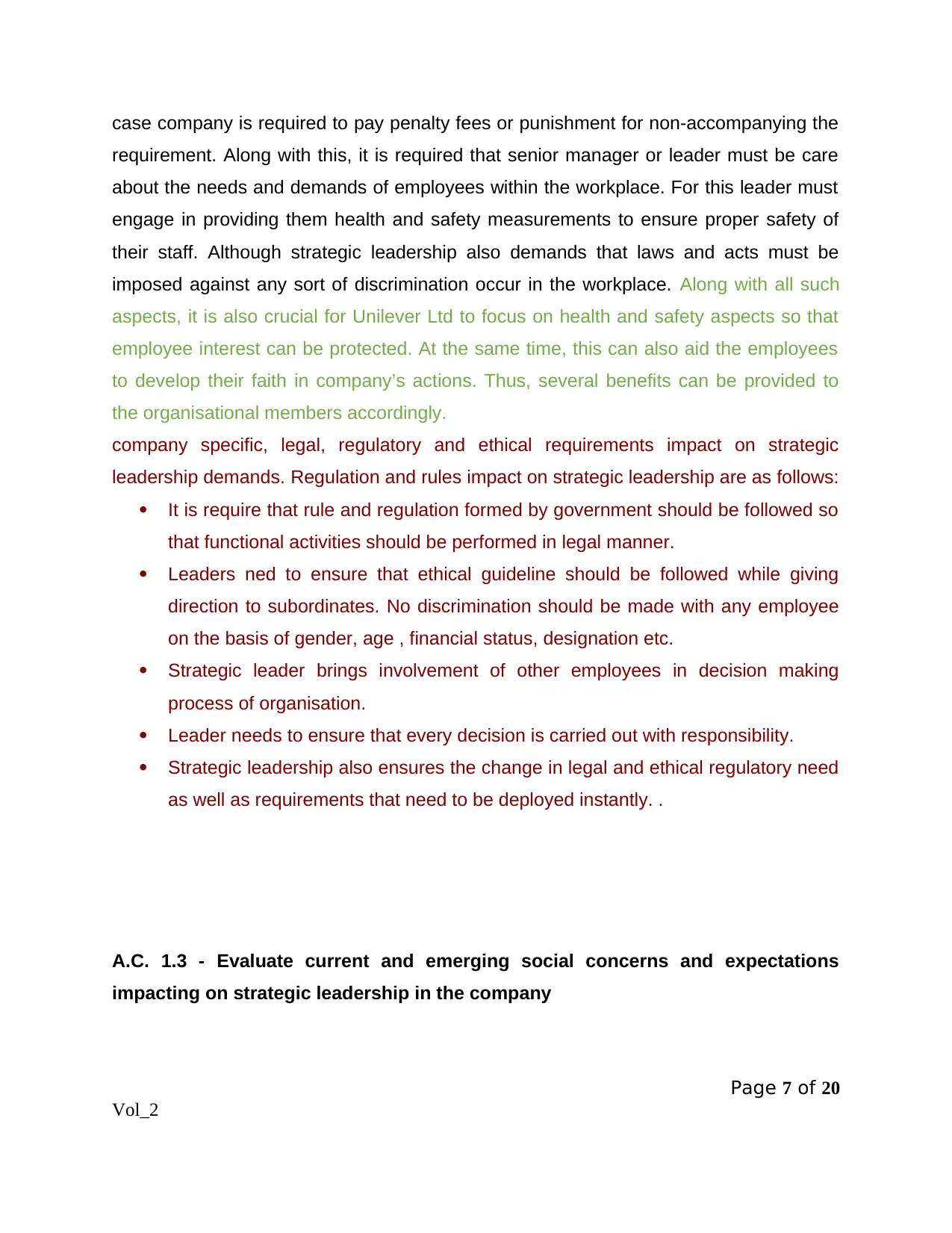
case company is required to pay penalty fees or punishment for non-accompanying the
requirement. Along with this, it is required that senior manager or leader must be care
about the needs and demands of employees within the workplace. For this leader must
engage in providing them health and safety measurements to ensure proper safety of
their staff. Although strategic leadership also demands that laws and acts must be
imposed against any sort of discrimination occur in the workplace. Along with all such
aspects, it is also crucial for Unilever Ltd to focus on health and safety aspects so that
employee interest can be protected. At the same time, this can also aid the employees
to develop their faith in company’s actions. Thus, several benefits can be provided to
the organisational members accordingly.
company specific, legal, regulatory and ethical requirements impact on strategic
leadership demands. Regulation and rules impact on strategic leadership are as follows:
It is require that rule and regulation formed by government should be followed so
that functional activities should be performed in legal manner.
Leaders ned to ensure that ethical guideline should be followed while giving
direction to subordinates. No discrimination should be made with any employee
on the basis of gender, age , financial status, designation etc.
Strategic leader brings involvement of other employees in decision making
process of organisation.
Leader needs to ensure that every decision is carried out with responsibility.
Strategic leadership also ensures the change in legal and ethical regulatory need
as well as requirements that need to be deployed instantly. .
A.C. 1.3 - Evaluate current and emerging social concerns and expectations
impacting on strategic leadership in the company
Page 7 of 20
Vol_2
requirement. Along with this, it is required that senior manager or leader must be care
about the needs and demands of employees within the workplace. For this leader must
engage in providing them health and safety measurements to ensure proper safety of
their staff. Although strategic leadership also demands that laws and acts must be
imposed against any sort of discrimination occur in the workplace. Along with all such
aspects, it is also crucial for Unilever Ltd to focus on health and safety aspects so that
employee interest can be protected. At the same time, this can also aid the employees
to develop their faith in company’s actions. Thus, several benefits can be provided to
the organisational members accordingly.
company specific, legal, regulatory and ethical requirements impact on strategic
leadership demands. Regulation and rules impact on strategic leadership are as follows:
It is require that rule and regulation formed by government should be followed so
that functional activities should be performed in legal manner.
Leaders ned to ensure that ethical guideline should be followed while giving
direction to subordinates. No discrimination should be made with any employee
on the basis of gender, age , financial status, designation etc.
Strategic leader brings involvement of other employees in decision making
process of organisation.
Leader needs to ensure that every decision is carried out with responsibility.
Strategic leadership also ensures the change in legal and ethical regulatory need
as well as requirements that need to be deployed instantly. .
A.C. 1.3 - Evaluate current and emerging social concerns and expectations
impacting on strategic leadership in the company
Page 7 of 20
Vol_2
Paraphrase This Document
Need a fresh take? Get an instant paraphrase of this document with our AI Paraphraser
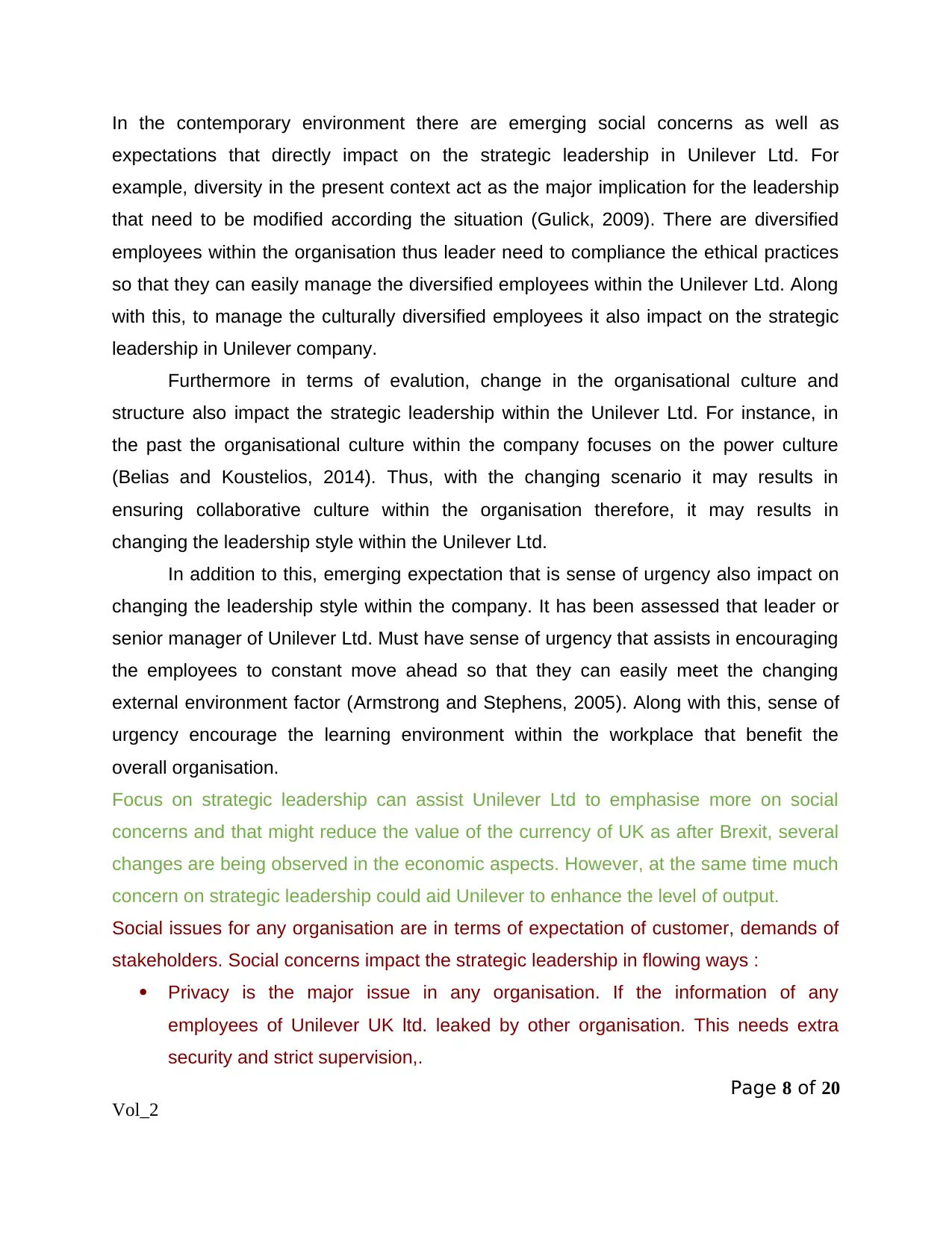
In the contemporary environment there are emerging social concerns as well as
expectations that directly impact on the strategic leadership in Unilever Ltd. For
example, diversity in the present context act as the major implication for the leadership
that need to be modified according the situation (Gulick, 2009). There are diversified
employees within the organisation thus leader need to compliance the ethical practices
so that they can easily manage the diversified employees within the Unilever Ltd. Along
with this, to manage the culturally diversified employees it also impact on the strategic
leadership in Unilever company.
Furthermore in terms of evalution, change in the organisational culture and
structure also impact the strategic leadership within the Unilever Ltd. For instance, in
the past the organisational culture within the company focuses on the power culture
(Belias and Koustelios, 2014). Thus, with the changing scenario it may results in
ensuring collaborative culture within the organisation therefore, it may results in
changing the leadership style within the Unilever Ltd.
In addition to this, emerging expectation that is sense of urgency also impact on
changing the leadership style within the company. It has been assessed that leader or
senior manager of Unilever Ltd. Must have sense of urgency that assists in encouraging
the employees to constant move ahead so that they can easily meet the changing
external environment factor (Armstrong and Stephens, 2005). Along with this, sense of
urgency encourage the learning environment within the workplace that benefit the
overall organisation.
Focus on strategic leadership can assist Unilever Ltd to emphasise more on social
concerns and that might reduce the value of the currency of UK as after Brexit, several
changes are being observed in the economic aspects. However, at the same time much
concern on strategic leadership could aid Unilever to enhance the level of output.
Social issues for any organisation are in terms of expectation of customer, demands of
stakeholders. Social concerns impact the strategic leadership in flowing ways :
Privacy is the major issue in any organisation. If the information of any
employees of Unilever UK ltd. leaked by other organisation. This needs extra
security and strict supervision,.
Page 8 of 20
Vol_2
expectations that directly impact on the strategic leadership in Unilever Ltd. For
example, diversity in the present context act as the major implication for the leadership
that need to be modified according the situation (Gulick, 2009). There are diversified
employees within the organisation thus leader need to compliance the ethical practices
so that they can easily manage the diversified employees within the Unilever Ltd. Along
with this, to manage the culturally diversified employees it also impact on the strategic
leadership in Unilever company.
Furthermore in terms of evalution, change in the organisational culture and
structure also impact the strategic leadership within the Unilever Ltd. For instance, in
the past the organisational culture within the company focuses on the power culture
(Belias and Koustelios, 2014). Thus, with the changing scenario it may results in
ensuring collaborative culture within the organisation therefore, it may results in
changing the leadership style within the Unilever Ltd.
In addition to this, emerging expectation that is sense of urgency also impact on
changing the leadership style within the company. It has been assessed that leader or
senior manager of Unilever Ltd. Must have sense of urgency that assists in encouraging
the employees to constant move ahead so that they can easily meet the changing
external environment factor (Armstrong and Stephens, 2005). Along with this, sense of
urgency encourage the learning environment within the workplace that benefit the
overall organisation.
Focus on strategic leadership can assist Unilever Ltd to emphasise more on social
concerns and that might reduce the value of the currency of UK as after Brexit, several
changes are being observed in the economic aspects. However, at the same time much
concern on strategic leadership could aid Unilever to enhance the level of output.
Social issues for any organisation are in terms of expectation of customer, demands of
stakeholders. Social concerns impact the strategic leadership in flowing ways :
Privacy is the major issue in any organisation. If the information of any
employees of Unilever UK ltd. leaked by other organisation. This needs extra
security and strict supervision,.
Page 8 of 20
Vol_2
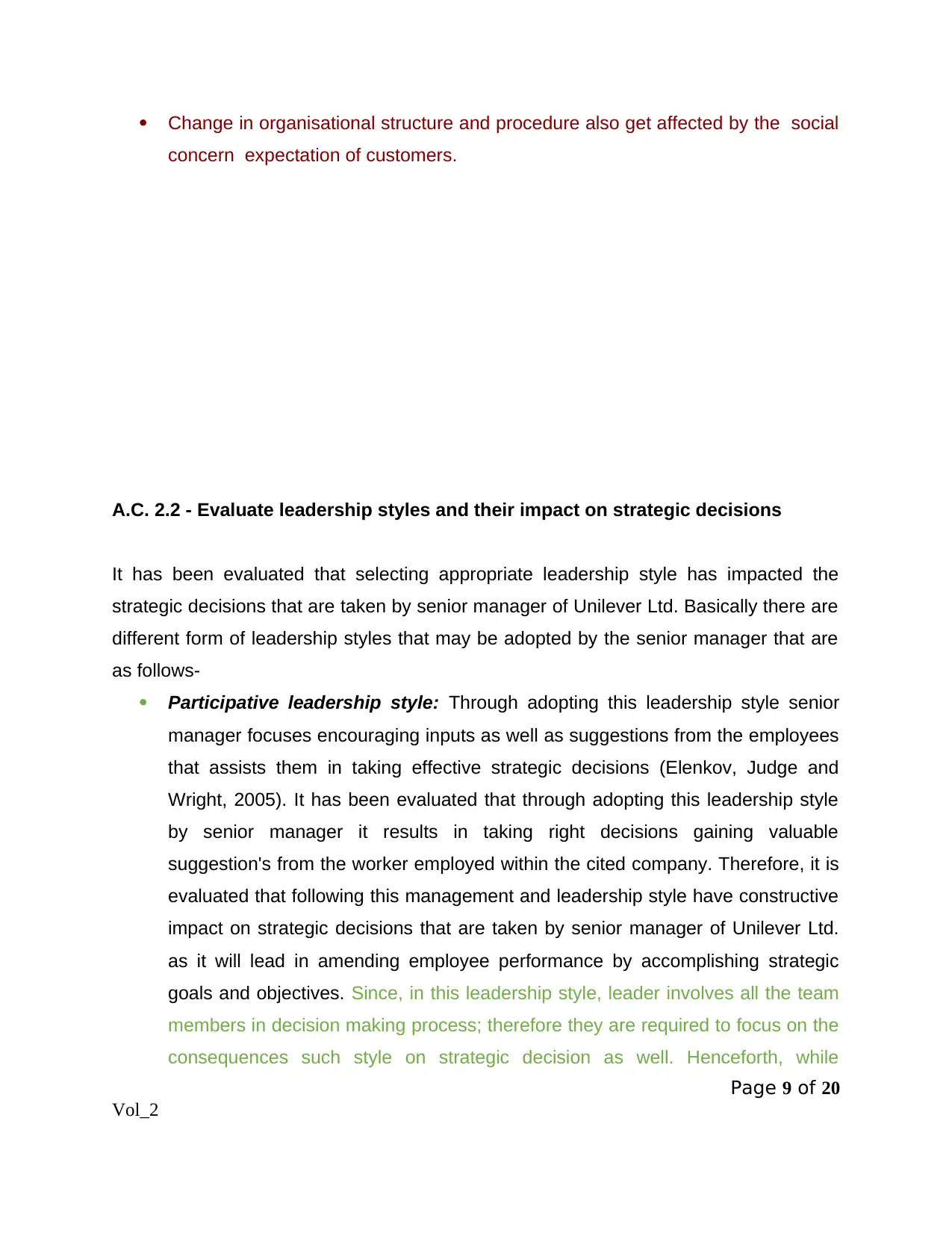
Change in organisational structure and procedure also get affected by the social
concern expectation of customers.
A.C. 2.2 - Evaluate leadership styles and their impact on strategic decisions
It has been evaluated that selecting appropriate leadership style has impacted the
strategic decisions that are taken by senior manager of Unilever Ltd. Basically there are
different form of leadership styles that may be adopted by the senior manager that are
as follows-
Participative leadership style: Through adopting this leadership style senior
manager focuses encouraging inputs as well as suggestions from the employees
that assists them in taking effective strategic decisions (Elenkov, Judge and
Wright, 2005). It has been evaluated that through adopting this leadership style
by senior manager it results in taking right decisions gaining valuable
suggestion's from the worker employed within the cited company. Therefore, it is
evaluated that following this management and leadership style have constructive
impact on strategic decisions that are taken by senior manager of Unilever Ltd.
as it will lead in amending employee performance by accomplishing strategic
goals and objectives. Since, in this leadership style, leader involves all the team
members in decision making process; therefore they are required to focus on the
consequences such style on strategic decision as well. Henceforth, while
Page 9 of 20
Vol_2
concern expectation of customers.
A.C. 2.2 - Evaluate leadership styles and their impact on strategic decisions
It has been evaluated that selecting appropriate leadership style has impacted the
strategic decisions that are taken by senior manager of Unilever Ltd. Basically there are
different form of leadership styles that may be adopted by the senior manager that are
as follows-
Participative leadership style: Through adopting this leadership style senior
manager focuses encouraging inputs as well as suggestions from the employees
that assists them in taking effective strategic decisions (Elenkov, Judge and
Wright, 2005). It has been evaluated that through adopting this leadership style
by senior manager it results in taking right decisions gaining valuable
suggestion's from the worker employed within the cited company. Therefore, it is
evaluated that following this management and leadership style have constructive
impact on strategic decisions that are taken by senior manager of Unilever Ltd.
as it will lead in amending employee performance by accomplishing strategic
goals and objectives. Since, in this leadership style, leader involves all the team
members in decision making process; therefore they are required to focus on the
consequences such style on strategic decision as well. Henceforth, while
Page 9 of 20
Vol_2
⊘ This is a preview!⊘
Do you want full access?
Subscribe today to unlock all pages.

Trusted by 1+ million students worldwide

undertaking decisions, leader must ensure that proper directions are being given
to the employees in all respect. This style is used to considering the best option
for various companies. In Unilever UK Ltd. this style creating positive impact
because it is emphasizes to management to offers guidance in team and
different department. In this aspect, leaders are reserve the right to ascertain
final decisions through encouraging feedback, ideas and suggestion's from
employees. Further, participative leaders are generally had more content
workforce with each individual to input the decision-making.
Autocratic leadership style: Another leadership style that can be followed by
senior manager of Unilever Ltd. Is autocratic leadership style. Under this style
senior manager strictly framed the policies as well as procedure that need to be
followed by employees those who are working in the company (Zhu, Chew and
Spangler, 2005). It has been evaluated that through adopting this leadership
style it will negatively impact the strategic decisions that are taken by the
manager itself as employees who are against the decisions will not perform
activities in the proper manner. Through this leadership style, leader needs to
focus on specific organisational directions so that the determined aim can be
attained. This is also useful in maintaining disciplinary aspects in the
organisation. This style is also known as authoritarian leadership which clearly
defines division between leaders and workers. Autocratic leaders of Unilever Ltd.
make decisions with no or little involvement of employees. Thus, it creates
negative impact on firm operations and no creativity is take place within the
business environment. In addition to this, employees are also feel disconnect
with one another person in this style.
Laissez Faire: It is another leadership style under which senior manger or leader
delegates all their responsibilities to their subordinates so that they may take
decisions by their own. It has been evaluated that focusing on this leadership
style is not effectual in Unilever Ltd. As it directly impact the strategic decisions
because there is no leader to influence their personnel in implementing the
strategic decisions that are taken by them (Kriger and Zhovtobryukh, 2016).
Page 10 of 20
Vol_2
to the employees in all respect. This style is used to considering the best option
for various companies. In Unilever UK Ltd. this style creating positive impact
because it is emphasizes to management to offers guidance in team and
different department. In this aspect, leaders are reserve the right to ascertain
final decisions through encouraging feedback, ideas and suggestion's from
employees. Further, participative leaders are generally had more content
workforce with each individual to input the decision-making.
Autocratic leadership style: Another leadership style that can be followed by
senior manager of Unilever Ltd. Is autocratic leadership style. Under this style
senior manager strictly framed the policies as well as procedure that need to be
followed by employees those who are working in the company (Zhu, Chew and
Spangler, 2005). It has been evaluated that through adopting this leadership
style it will negatively impact the strategic decisions that are taken by the
manager itself as employees who are against the decisions will not perform
activities in the proper manner. Through this leadership style, leader needs to
focus on specific organisational directions so that the determined aim can be
attained. This is also useful in maintaining disciplinary aspects in the
organisation. This style is also known as authoritarian leadership which clearly
defines division between leaders and workers. Autocratic leaders of Unilever Ltd.
make decisions with no or little involvement of employees. Thus, it creates
negative impact on firm operations and no creativity is take place within the
business environment. In addition to this, employees are also feel disconnect
with one another person in this style.
Laissez Faire: It is another leadership style under which senior manger or leader
delegates all their responsibilities to their subordinates so that they may take
decisions by their own. It has been evaluated that focusing on this leadership
style is not effectual in Unilever Ltd. As it directly impact the strategic decisions
because there is no leader to influence their personnel in implementing the
strategic decisions that are taken by them (Kriger and Zhovtobryukh, 2016).
Page 10 of 20
Vol_2
Paraphrase This Document
Need a fresh take? Get an instant paraphrase of this document with our AI Paraphraser
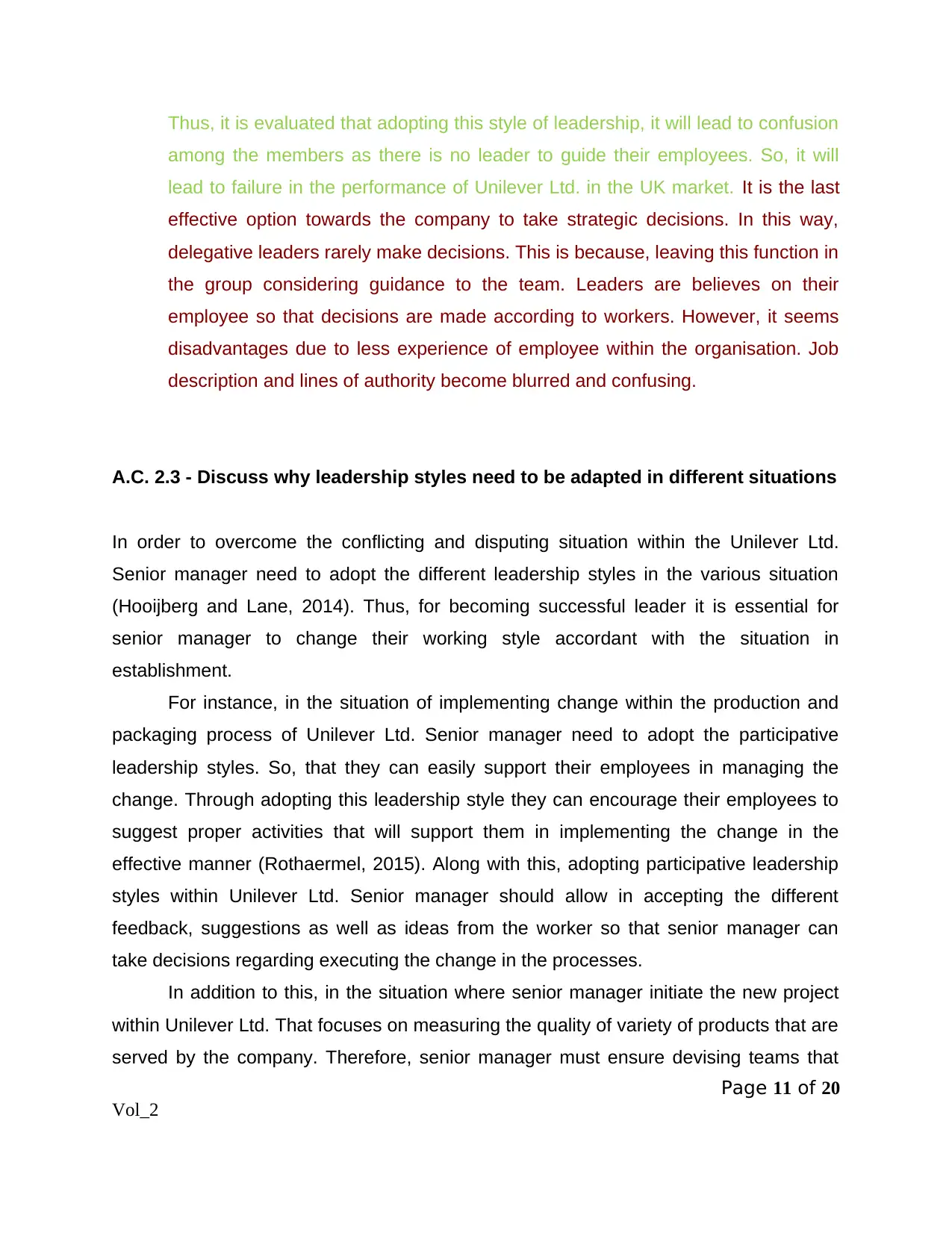
Thus, it is evaluated that adopting this style of leadership, it will lead to confusion
among the members as there is no leader to guide their employees. So, it will
lead to failure in the performance of Unilever Ltd. in the UK market. It is the last
effective option towards the company to take strategic decisions. In this way,
delegative leaders rarely make decisions. This is because, leaving this function in
the group considering guidance to the team. Leaders are believes on their
employee so that decisions are made according to workers. However, it seems
disadvantages due to less experience of employee within the organisation. Job
description and lines of authority become blurred and confusing.
A.C. 2.3 - Discuss why leadership styles need to be adapted in different situations
In order to overcome the conflicting and disputing situation within the Unilever Ltd.
Senior manager need to adopt the different leadership styles in the various situation
(Hooijberg and Lane, 2014). Thus, for becoming successful leader it is essential for
senior manager to change their working style accordant with the situation in
establishment.
For instance, in the situation of implementing change within the production and
packaging process of Unilever Ltd. Senior manager need to adopt the participative
leadership styles. So, that they can easily support their employees in managing the
change. Through adopting this leadership style they can encourage their employees to
suggest proper activities that will support them in implementing the change in the
effective manner (Rothaermel, 2015). Along with this, adopting participative leadership
styles within Unilever Ltd. Senior manager should allow in accepting the different
feedback, suggestions as well as ideas from the worker so that senior manager can
take decisions regarding executing the change in the processes.
In addition to this, in the situation where senior manager initiate the new project
within Unilever Ltd. That focuses on measuring the quality of variety of products that are
served by the company. Therefore, senior manager must ensure devising teams that
Page 11 of 20
Vol_2
among the members as there is no leader to guide their employees. So, it will
lead to failure in the performance of Unilever Ltd. in the UK market. It is the last
effective option towards the company to take strategic decisions. In this way,
delegative leaders rarely make decisions. This is because, leaving this function in
the group considering guidance to the team. Leaders are believes on their
employee so that decisions are made according to workers. However, it seems
disadvantages due to less experience of employee within the organisation. Job
description and lines of authority become blurred and confusing.
A.C. 2.3 - Discuss why leadership styles need to be adapted in different situations
In order to overcome the conflicting and disputing situation within the Unilever Ltd.
Senior manager need to adopt the different leadership styles in the various situation
(Hooijberg and Lane, 2014). Thus, for becoming successful leader it is essential for
senior manager to change their working style accordant with the situation in
establishment.
For instance, in the situation of implementing change within the production and
packaging process of Unilever Ltd. Senior manager need to adopt the participative
leadership styles. So, that they can easily support their employees in managing the
change. Through adopting this leadership style they can encourage their employees to
suggest proper activities that will support them in implementing the change in the
effective manner (Rothaermel, 2015). Along with this, adopting participative leadership
styles within Unilever Ltd. Senior manager should allow in accepting the different
feedback, suggestions as well as ideas from the worker so that senior manager can
take decisions regarding executing the change in the processes.
In addition to this, in the situation where senior manager initiate the new project
within Unilever Ltd. That focuses on measuring the quality of variety of products that are
served by the company. Therefore, senior manager must ensure devising teams that
Page 11 of 20
Vol_2
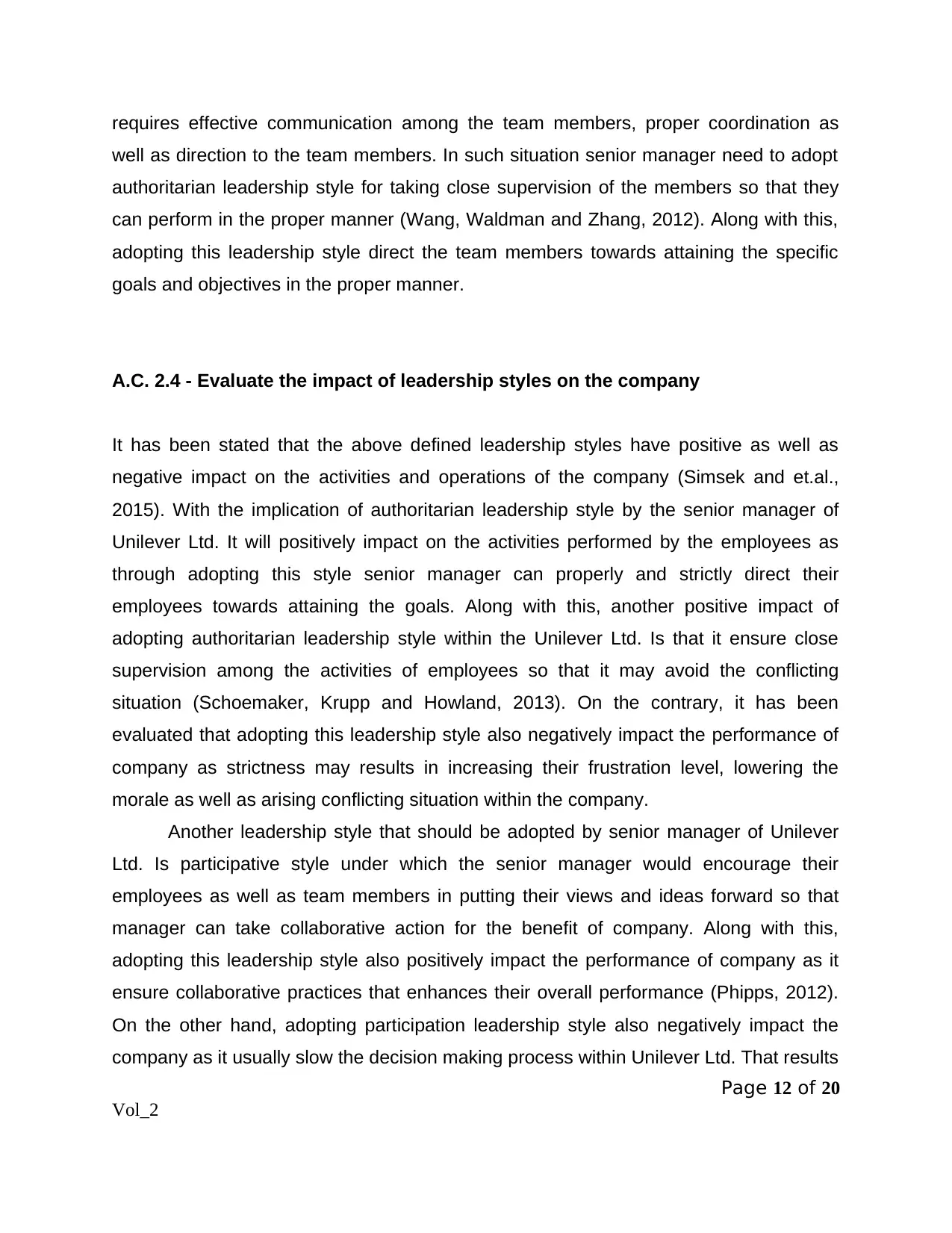
requires effective communication among the team members, proper coordination as
well as direction to the team members. In such situation senior manager need to adopt
authoritarian leadership style for taking close supervision of the members so that they
can perform in the proper manner (Wang, Waldman and Zhang, 2012). Along with this,
adopting this leadership style direct the team members towards attaining the specific
goals and objectives in the proper manner.
A.C. 2.4 - Evaluate the impact of leadership styles on the company
It has been stated that the above defined leadership styles have positive as well as
negative impact on the activities and operations of the company (Simsek and et.al.,
2015). With the implication of authoritarian leadership style by the senior manager of
Unilever Ltd. It will positively impact on the activities performed by the employees as
through adopting this style senior manager can properly and strictly direct their
employees towards attaining the goals. Along with this, another positive impact of
adopting authoritarian leadership style within the Unilever Ltd. Is that it ensure close
supervision among the activities of employees so that it may avoid the conflicting
situation (Schoemaker, Krupp and Howland, 2013). On the contrary, it has been
evaluated that adopting this leadership style also negatively impact the performance of
company as strictness may results in increasing their frustration level, lowering the
morale as well as arising conflicting situation within the company.
Another leadership style that should be adopted by senior manager of Unilever
Ltd. Is participative style under which the senior manager would encourage their
employees as well as team members in putting their views and ideas forward so that
manager can take collaborative action for the benefit of company. Along with this,
adopting this leadership style also positively impact the performance of company as it
ensure collaborative practices that enhances their overall performance (Phipps, 2012).
On the other hand, adopting participation leadership style also negatively impact the
company as it usually slow the decision making process within Unilever Ltd. That results
Page 12 of 20
Vol_2
well as direction to the team members. In such situation senior manager need to adopt
authoritarian leadership style for taking close supervision of the members so that they
can perform in the proper manner (Wang, Waldman and Zhang, 2012). Along with this,
adopting this leadership style direct the team members towards attaining the specific
goals and objectives in the proper manner.
A.C. 2.4 - Evaluate the impact of leadership styles on the company
It has been stated that the above defined leadership styles have positive as well as
negative impact on the activities and operations of the company (Simsek and et.al.,
2015). With the implication of authoritarian leadership style by the senior manager of
Unilever Ltd. It will positively impact on the activities performed by the employees as
through adopting this style senior manager can properly and strictly direct their
employees towards attaining the goals. Along with this, another positive impact of
adopting authoritarian leadership style within the Unilever Ltd. Is that it ensure close
supervision among the activities of employees so that it may avoid the conflicting
situation (Schoemaker, Krupp and Howland, 2013). On the contrary, it has been
evaluated that adopting this leadership style also negatively impact the performance of
company as strictness may results in increasing their frustration level, lowering the
morale as well as arising conflicting situation within the company.
Another leadership style that should be adopted by senior manager of Unilever
Ltd. Is participative style under which the senior manager would encourage their
employees as well as team members in putting their views and ideas forward so that
manager can take collaborative action for the benefit of company. Along with this,
adopting this leadership style also positively impact the performance of company as it
ensure collaborative practices that enhances their overall performance (Phipps, 2012).
On the other hand, adopting participation leadership style also negatively impact the
company as it usually slow the decision making process within Unilever Ltd. That results
Page 12 of 20
Vol_2
⊘ This is a preview!⊘
Do you want full access?
Subscribe today to unlock all pages.

Trusted by 1+ million students worldwide
1 out of 20
Related Documents
Your All-in-One AI-Powered Toolkit for Academic Success.
+13062052269
info@desklib.com
Available 24*7 on WhatsApp / Email
![[object Object]](/_next/static/media/star-bottom.7253800d.svg)
Unlock your academic potential
Copyright © 2020–2026 A2Z Services. All Rights Reserved. Developed and managed by ZUCOL.




